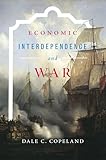Economic Interdependence and War / Dale C. Copeland.
Material type: TextSeries: Princeton Studies in International History and Politics ; 148Publisher: Princeton, NJ : Princeton University Press, [2014]Copyright date: ©2015Edition: Pilot project. eBook available to selected US libraries onlyDescription: 1 online resource (504 p.) : 1 line illus. 7 tablesContent type:
TextSeries: Princeton Studies in International History and Politics ; 148Publisher: Princeton, NJ : Princeton University Press, [2014]Copyright date: ©2015Edition: Pilot project. eBook available to selected US libraries onlyDescription: 1 online resource (504 p.) : 1 line illus. 7 tablesContent type: - 9780691161587
- 9781400852703
- Competition, International
- Economic history -- 1750-1918
- Economic history -- 1918-
- Military history, Modern
- Natural resources -- Political aspects
- War -- Causes
- War -- Economic aspects -- History
- POLITICAL SCIENCE / International Relations / General
- American oil embargo
- China
- Cold War
- Europe
- European great powers
- Japanese economy
- Japanese foreign policy
- Manchuria
- Nazism
- Pacific War
- Russo-Japanese War
- Shidehara Kijuro
- Sino-American relations
- Taisho democracy
- USЃhinese relations
- USЊapanese relations
- USГoviet relations
- World War I
- World War II
- case study research
- causal theories
- colonial territory
- commerce
- commercial expectations
- conflict
- democratic peace
- economic interdependence
- economic peace
- existing literature
- existing scholarship
- future probabilities
- future trade
- global politics
- global war
- great power politics
- great power system
- great powers
- historical analysis
- imperial expansion
- interdependence
- international political economy
- international relations
- interstate commerce
- investment
- large-N quantitative research
- leader expectations
- liberalism
- modern conflict
- nineteenth-century geopolitics
- political control
- preventive wars
- quantitative analysis
- rare events research
- realism
- third-party territories
- trade expectations theory
- trade expectations
- trade
- war
- 355.0273 23
- HB195
- online - DeGruyter
- Issued also in print.
| Item type | Current library | Call number | URL | Status | Notes | Barcode | |
|---|---|---|---|---|---|---|---|
 eBook
eBook
|
Biblioteca "Angelicum" Pont. Univ. S.Tommaso d'Aquino Nuvola online | online - DeGruyter (Browse shelf(Opens below)) | Online access | Not for loan (Accesso limitato) | Accesso per gli utenti autorizzati / Access for authorized users | (dgr)9781400852703 |
Frontmatter -- Contents -- Preface -- Abbreviations for Primary Documents and Source Material -- INTRODUCTION -- CHAPTER ONE. Theory of Economic Interdependence and War -- CHAPTER TWO. Quantitative Analysis and Qualitative Case Study Research -- CHAPTER THREE. The Russo-Japanese War and the German Wars for Hegemony, 1890-1939 -- CHAPTER FOUR. The Prelude to Pearl Harbor: Japanese Security and the Northern Question, 1905-40 -- CHAPTER FIVE. The Russian Problem and the Onset of the Pacific War, March−December 1941 -- CHAPTER SIX. The Origins, Dynamics, and Termination of the Cold War, 1942-91 -- CHAPTER SEVEN. European Great Power Politics, 1790-1854 -- CHAPTER EIGHT. Great Power Politics in the Age of Imperial Expansion, 1856-99 -- CHAPTER NINE. Implications of the Argument -- Bibliography -- Index
restricted access online access with authorization star
http://purl.org/coar/access_right/c_16ec
Does growing economic interdependence among great powers increase or decrease the chance of conflict and war? Liberals argue that the benefits of trade give states an incentive to stay peaceful. Realists contend that trade compels states to struggle for vital raw materials and markets. Moving beyond the stale liberal-realist debate, Economic Interdependence and War lays out a dynamic theory of expectations that shows under what specific conditions interstate commerce will reduce or heighten the risk of conflict between nations.Taking a broad look at cases spanning two centuries, from the Napoleonic and Crimean wars to the more recent Cold War crises, Dale Copeland demonstrates that when leaders have positive expectations of the future trade environment, they want to remain at peace in order to secure the economic benefits that enhance long-term power. When, however, these expectations turn negative, leaders are likely to fear a loss of access to raw materials and markets, giving them more incentive to initiate crises to protect their commercial interests. The theory of trade expectations holds important implications for the understanding of Sino-American relations since 1985 and for the direction these relations will likely take over the next two decades.Economic Interdependence and War offers sweeping new insights into historical and contemporary global politics and the actual nature of democratic versus economic peace.
Issued also in print.
Mode of access: Internet via World Wide Web.
In English.
Description based on online resource; title from PDF title page (publisher's Web site, viewed 30. Aug 2021)


